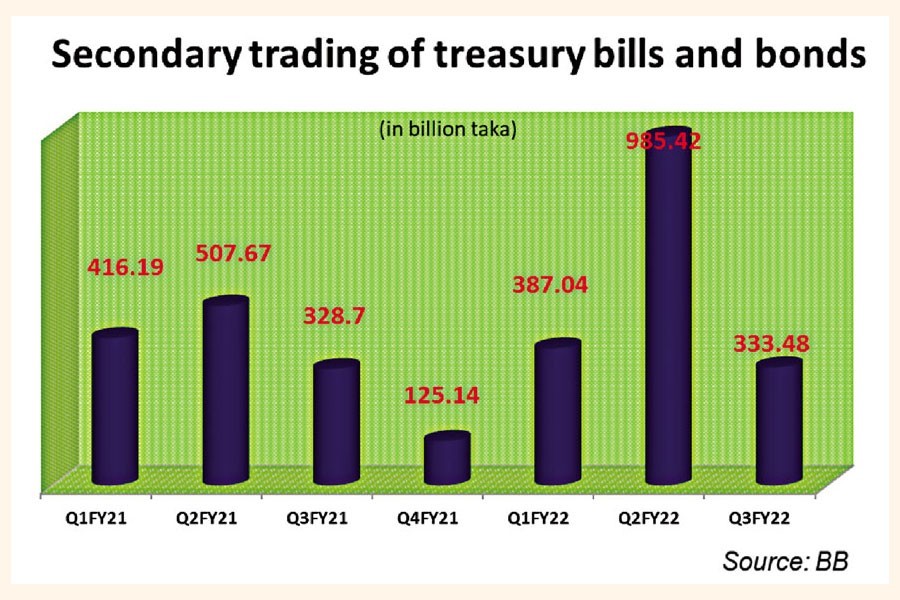Transactions of the government's fixed income tradable securities in the secondary market jumped significantly in the first nine months (July-March) of the current fiscal year (FY22).
Bangladesh Bank statistics showed that combined secondary trading of these securities was recorded at Tk 1,706 billion in the first nine months of the current fiscal year compared to Tk 1,252.56 billion in the same period of the last fiscal year (FY21).
Thus the secondary trading of the government fixed income tradable debt instruments increased by 36 per cent during the period under review.
Treasury bills are short-term debt instruments of the government and treasury bonds are long-term in nature. These debt instruments are tradable in the secondary market.
The central bank, on behalf of the government, issues the treasury bills to manage day-to-day liquidity and treasury bonds in order to finance the budget deficit.
Bangladesh Bank statistics also showed that combined transactions of these securities were recorded at Tk 387 billion in the first quarter (July-September) of the current fiscal year which increased to Tk 985.42 billion in the second quarter (October-December) of the year. The transaction, however, dropped sharply to Tk 333.48 billion in the third quarter (January-March) of FY22.
The combined value of annual secondary transactions of treasury bills and bonds was at Tk 1377.70 billion (or Tk 1.37 trillion) in the last fiscal year (FY21).
Thus the total transaction of these securities in the first three quarters of the current fiscal year has crossed the total annual secondary trading of the treasury bills and bonds in the last fiscal year.
In FY20, the total transaction value was recorded at Tk 594.77 billion.
The government borrows funds from domestic sources by issuing tradable and non-tradable securities.
Tradable securities, such as 14-day, 91-day, 182-day, and 364-day treasury bills and 2-year, 5-year, 10-year, 15-year and 20-year treasury bonds are available in the market. There are also Floating-Rate Treasury Bond (FRTB), which has a three-year maturity and 14-day T-Bills for short-term financial management.
Non-tradable securities include Sanchayapatras (savings certificates), Sanchaya-bonds, and Prize bonds.
Resident individuals and institutions, such as banks, non-bank financial institutions (NBFIs), insurance companies, corporations, provident funds, pension funds, etc., can purchase and trade treasury bills and treasury bonds.
Foreign and non-resident individuals and institutions can, however, invest only in long-term debt securities or treasury bonds only.
Until 2003, only commercial banks were permitted to purchase treasury securities. There were 30-day, 91-day, 180-day, and 1-year T-bills on the market at that time.
Despite the instruments' tradability, secondary trading was not prevalent due to the small number of buyers and sellers. Under the Financial Institutions Development Project (FIDP) funded by the World Bank Group, the Ministry of Finance and Bangladesh Bank took various steps to build a viable secondary market for debt securities, according to the Bangladesh Government Securities Report for FY 2020-21.
Following that, financial institutions (FIs) were permitted to engage in the government securities secondary market alongside banks. The government securities trading began in 2003 with electronic registration and listing in the Central Depository of Bangladesh Limited (CDBL).
In 2003, the central bank also launched the Primary Dealer (PD) system, appointing eight banks and one NBFI as PDs for primary issuance and market development of the securities.
To attain the government's long-term development ambitions, 5-year and 10-year T-bonds were introduced alongside short-term T-bills. To meet the deficit budget's borrowing needs, the government also published the yearly auction schedule for the first time in FY07, bringing transparency to the market.
Subsequently, in FY08, to meet the government's long-term financing needs, 15-year and 20-year T-bonds were issued, providing long-term investment opportunities to investors such as insurance companies, provident funds, and pension funds.
At that same time, Bangladesh Bank expanded the PD system's reach by offering incentives and liquidity support against collateralised instruments. BB strengthened its role as market maker by introducing bidding commitments and underwriting obligations on PDs for T-bill and bond auctions.
There are currently 22 banks acting as PDs to bring dynamism to the primary and secondary markets of the government securities. Thus, any individual or institution that wants to invest in these securities has to go through a PD bank or any authorised banks or NBFIs.


